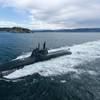Last summer, the U.S. Navy billed the Taiwan government $2.5m to cover the cost of a little-known operation dedicated to helping Taipei close a ground-breaking arms deal to acquire eight American-made diesel submarines. But after investing about $8m since 2001, Taiwan refused to pay, despite Navy warnings in two August 2005 memos that it would shut down its submarine "pre-selection" operation without more money, a move sure to trigger long delays and higher costs. When President Bush approved Taiwan's request for arms in April 2001, the weapons deal was heralded as a turning point in U.S. relations with the Taiwan government, which clamored for years to augment its four aging submarines -- two of them World-War II-era boats from U.S. shipyards -- to deter China's rapidly strengthening navy. But five years later, the U.S.-Taiwan submarine deal has run aground, with responsibility for the situation resting in both Taipei and Washington. For its part, Taiwan has failed more than 40 times to appropriate $12b for the subs amid a continuing political battle over the costs and need for submarines, as well as fears of provoking China. But Navy officials’ resistance to diesel submarine exports has been tacitly accepted by Pentagon and other administration officials, whose growing indifference has helped to lock the deal in neutral. Publicly, the Navy backs the submarine sale, and senior officials say they are poised to carry it out once Taiwan appropriates money. But the Navy, with a long history of blocking diesel submarine exports, has erected barriers to make the submarines economically unattractive, and perhaps even unfeasible, for Taiwan, according to several former administration officials. An independent cost estimate sought by the Navy in 2002 put the price tag for eight submarines at about $12b -- an amount far higher than earlier, unofficial estimates and one quickly decried by Taiwan officials as exorbitant. Meanwhile, the Navy has steadfastly required Taiwan to appropriate all the money for the submarines up front, before the Taiwanese inspect the design. Additionally, senior defense officials limited Taiwan's role on the submarine program to repair and maintenance in 2004, shooting down Taiwan's efforts to create jobs domestically by co-producing the submarines. The Navy's chief concern, according to the former officials, is a widespread fear that moving forward with the Taiwan submarines could dismantle the all-nuclear submarine force. If U.S. shipbuilders, none of whom have built a diesel submarine in more than 40 years, returned to the diesel business, the Navy worries a budget-minded Congress would choose less expensive, but also less capable, boats for the U.S. fleet. Many U.S. officials also prefer that Taiwan instead buy P-3C maritime patrol aircraft as well as PAC-3 antimissile systems approved in a later deal. The Pentagon has increasingly viewed those technologies as far more necessary for Taiwan's defense in the event of a China offensive. Despite Navy resistance, most former officials agree that Taiwan could help put the deal in motion by appropriating the funds. (Source: GovExec.com)
Sponsored Content
Chris-Marine’s solutions help to prolong engine lifetime

Subscribe for
Maritime Reporter E-News
Maritime Reporter E-News is the maritime industry's largest circulation and most authoritative ENews Service, delivered to your Email five times per week










